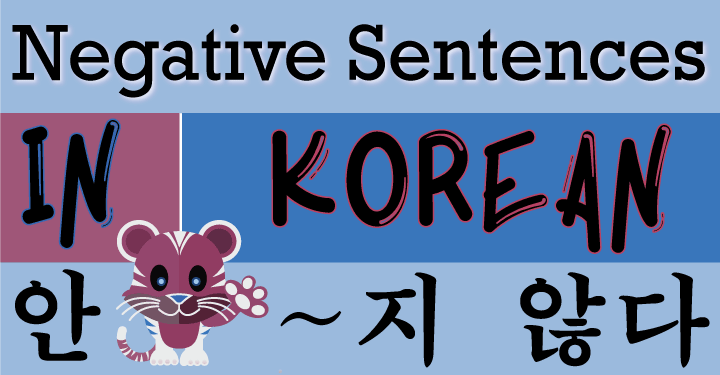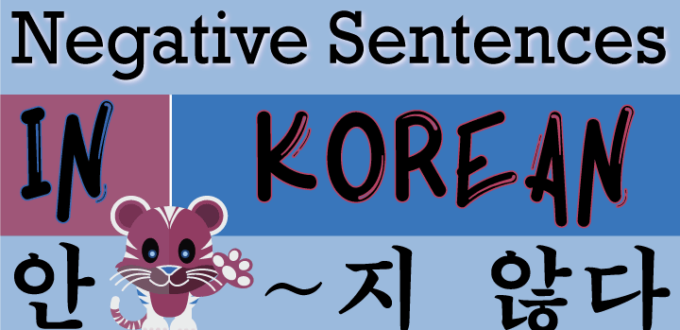
3 Ways for How to Make Negative Sentences in Korean
Sometimes you need a way to tell your Korean friends, “Um… I don’t eat things like live squid.” This lesson covers 3 essential ways for how to make negative sentences in Korean.
- The adverb 안
- The verb ending ~지 않다
- Negative verbs in Korean
안 Don’t, Not in Korean
As you may have guessed, 안 sounds a lot like the word 아니, “No” in Korean because that’s where 안 comes from. 안 is an adverb meaning “Don’t” or “Not” in Korean.
안 is used to make statements or ask questions. 안 is not used in imperative sentences to make demands like “Don’t smoke.” 안 is also not used in propositive sentences to make suggestions like, “Let’s not exercise today.”
안 is placed before a verb to express the meanings:
- “I don’t do that.” as a habit or routine.
- “I’m not doing that.” in the near future.

| Polite Present Tense Korean | English |
| 안 가요 | don’t go |
| 안 먹어요 | don’t eat |
| 안 와요 | don’t come |
| 안 예뻐요 | not pretty |
| 안 아파요 | doesn’t hurt |
| 안 커요 | not big |
Did you know that 하다 means “Do” in Korean? And that 하다 verbs are made up of a noun + 하다?
운동 = exercise
운동하다 = do exercise
행복 = happiness
행복하다 = be happy
When using 안 with (noun + 하다) verbs, the noun must be separated from 하다 so that 안 may be placed in the middle.

| Korean | English |
| 운동 안 해요 | don’t do exercise |
| 행복 안 해요 | not happy |
| 공부 안 해요 | don’t study |
| 수영 안 해요 | don’t swim |
Read the context around negative sentences in Korean.
“나는 학교에 안 가요.” could have a couple of different meanings depending on the context around it.
If a student said this, it could mean, “I’m not going to school today.”
If a 25 year old said this, it could mean, “I don’t go to school.”
Sample Sentences in Korean:
그 가수는 안 예뻐요. = That singer isn’t pretty.
나는 돼지고기 안 먹어요. = I don’t eat pork.
산타클로스 안 와요? = Santa Claus isn’t coming?
나는 행복 안 해요. = I’m not happy.
[mailmunch-form id=”358156″]
~지 않다 Not, Don’t in Korean
~지 않다 is a verb ending meaning “Not” or “Don’t” in Korean. ~지 않다 is a bit more formal than 안 and you will see it used in writing more often than 안.
Like 안, ~지 않다 is used to make statements or ask questions. ~지 않다 is not used in imperative sentences to make demands like “Don’t smoke.” ~지 않다 is also not used in propositive sentences to make suggestions like, “Let’s not exercise today.”

| Polite Present Tense Korean | English |
| 가지 않아요 | don’t go |
| 먹지 않아요 | don’t eat |
| 오지 않아요 | don’t come |
| 예쁘지 않아요 | not pretty |
| 아프지 않아요 | doesn’t hurt |
| 크지 않아요 | not big |
Sample Sentences in Korean:
그 가수는 예쁘지 않아요. = That singer isn’t pretty.
나는 돼지고기 먹지 않아요. = I don’t eat pork.
산타클로스 오지 않아요? = Santa Claus isn’t coming?
나는 행복 안 하지 않아요.. = I’m not happy.
Negative Verbs in Korean
Negative verbs are verbs that have corresponding verbs with a positive meaning. You cannot use the verbs with the positive meanings with 안, “Not” or “Don’t” in Korean.
You shouldn’t say “안 알아요” but you should instead say “모라요.”
List of Positive and Negative Korean Verbs
| Positive Verbs | Negative Verb | English |
| 알다 | 모르다 | know / not know |
| 있다 | 없다 | exist, have / not exist, not have |
| 맛있다 | 맛없다 | delicious / not delicious |
Free PDF Reference Sheet
Negative Sentences in Korean

Fill out the form below to get your free PDF reference sheet.
[mailmunch-form id=”358156″]



Leave a Reply
You must be logged in to post a comment.